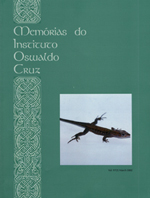
|
Memórias do Instituto Oswaldo Cruz
Fundação Oswaldo Cruz, Fiocruz
ISSN: 1678-8060
EISSN: 1678-8060
Vol. 109, No. 1, 2014, pp. 99-107
|
 Bioline Code: oc14013
Bioline Code: oc14013
Full paper language: English
Document type: Research Article
Document available free of charge
|
|
|
Memórias do Instituto Oswaldo Cruz, Vol. 109, No. 1, 2014, pp. 99-107
| en |
Single nucleotide polymorphisms in the interferon gamma gene are associated with distinct types of retinochoroidal scar lesions presumably caused by Toxoplasma gondii  infection infection
Peixe, Ricardo Guerra; Boechat, Marcela Santana Bastos; Rangel, Alba Lucinia Peixoto; Rosa, Rhônia França Gomes; Petzl-Erler, Maria Luiza & Bahia-Oliveira, Lilian MG
Abstract
The association of single nucleotide polymorphisms (SNPs) in the interferon (IFN)-γ gene (IFNG) with different types of retinal scar lesions presumably caused by toxoplasmosis were investigated in a cross-sectional population-based genetic study. Ten SNPs were investigated and after Bonferroni correction, only the associations between SNPs rs2069718 and rs3181035 with retinal/retinochoroidal scar lesions type A (most severe scar lesions) and C (least severe scar lesions), respectively, remained significant. The associations of two different IFNG SNPs with two different types of retinal lesions attributable to toxoplasmosis support the hypothesis that different inflammatory mechanisms underlie the development of these lesions. The in vitro analysis of IFN-γ secretion by peripheral blood mononuclear cells stimulated with Toxoplasma gondii antigens was also investigated. The association between SNP rs2069718 and type A scar lesions revealed that differential IFN-γ levels are correlated with distinct genotypes. However, no correlation was observed with IFN-γ secretion levels and the SNP rs3181035, which was significantly associated with type C scar lesions. Our findings strongly suggest that immunogenetic studies of individuals with congenital or postnatally acquired infection are needed to better understand the role of IFN-γ and its polymorphisms in the pathogenesis of ocular toxoplasmosis.
Keywords
single-nucleotide polymorphisms; IFN-γ; Toxoplasma gondii; uveitis; retinochoroiditis
|
| |
© Memórias do Instituto Oswaldo Cruz
Alternative site location: http://memorias.ioc.fiocruz.br
|
|
